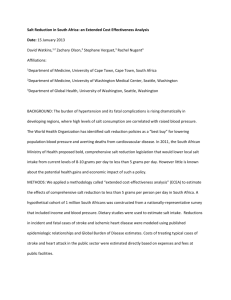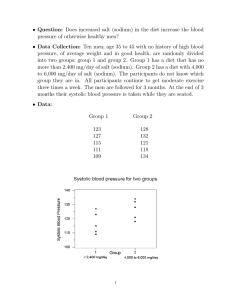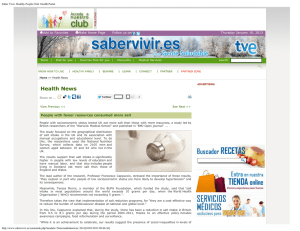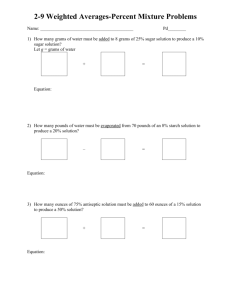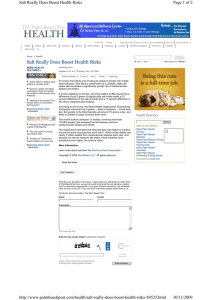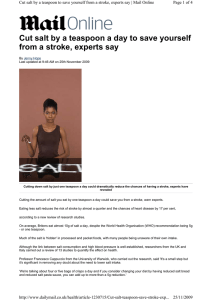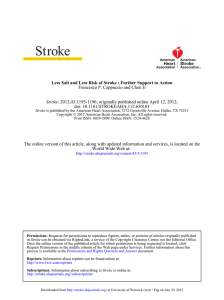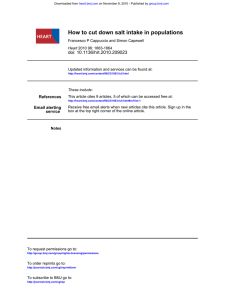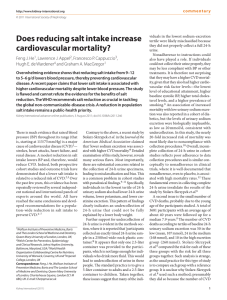Cuts in salt would reduce stroke, heart risks: study OTHER HEADLINES
advertisement
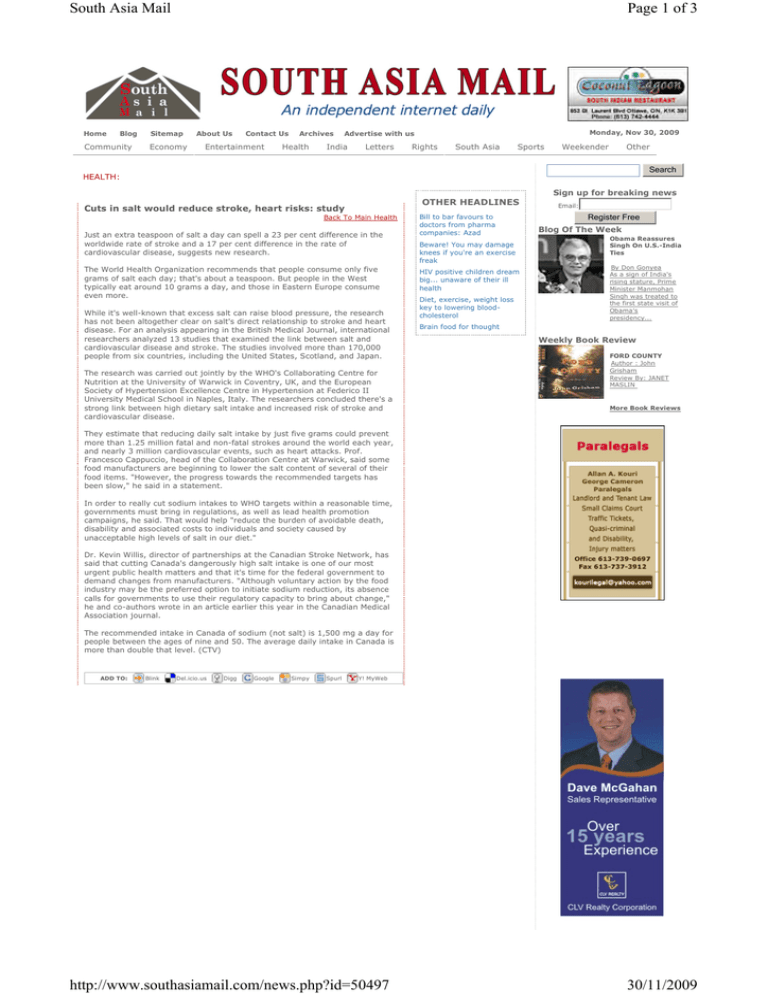
South Asia Mail Home Blog Community Page 1 of 3 Sitemap Economy About Us Contact Us Entertainment Archives Health Monday, Nov 30, 2009 Advertise with us India Letters Rights South Asia Sports Weekender Other Search HEALTH: OTHER HEADLINES Cuts in salt would reduce stroke, heart risks: study Back To Main Health Just an extra teaspoon of salt a day can spell a 23 per cent difference in the worldwide rate of stroke and a 17 per cent difference in the rate of cardiovascular disease, suggests new research. The World Health Organization recommends that people consume only five grams of salt each day; that's about a teaspoon. But people in the West typically eat around 10 grams a day, and those in Eastern Europe consume even more. While it's well-known that excess salt can raise blood pressure, the research has not been altogether clear on salt's direct relationship to stroke and heart disease. For an analysis appearing in the British Medical Journal, international researchers analyzed 13 studies that examined the link between salt and cardiovascular disease and stroke. The studies involved more than 170,000 people from six countries, including the United States, Scotland, and Japan. The research was carried out jointly by the WHO's Collaborating Centre for Nutrition at the University of Warwick in Coventry, UK, and the European Society of Hypertension Excellence Centre in Hypertension at Federico II University Medical School in Naples, Italy. The researchers concluded there's a strong link between high dietary salt intake and increased risk of stroke and cardiovascular disease. Bill to bar favours to doctors from pharma companies: Azad Beware! You may damage knees if you're an exercise freak HIV positive children dream big... unaware of their ill health Diet, exercise, weight loss key to lowering bloodcholesterol Sign up for breaking news Email: Register Free Blog Of The Week Obama Reassures Singh On U.S.-India Ties By Don Gonyea As a sign of India's rising stature, Prime Minister Manmohan Singh was treated to the first state visit of Obama's presidency... Brain food for thought Weekly Book Review FORD COUNTY Author : John Grisham Review By: JANET MASLIN More Book Reviews They estimate that reducing daily salt intake by just five grams could prevent more than 1.25 million fatal and non-fatal strokes around the world each year, and nearly 3 million cardiovascular events, such as heart attacks. Prof. Francesco Cappuccio, head of the Collaboration Centre at Warwick, said some food manufacturers are beginning to lower the salt content of several of their food items. "However, the progress towards the recommended targets has been slow," he said in a statement. In order to really cut sodium intakes to WHO targets within a reasonable time, governments must bring in regulations, as well as lead health promotion campaigns, he said. That would help "reduce the burden of avoidable death, disability and associated costs to individuals and society caused by unacceptable high levels of salt in our diet." Dr. Kevin Willis, director of partnerships at the Canadian Stroke Network, has said that cutting Canada's dangerously high salt intake is one of our most urgent public health matters and that it's time for the federal government to demand changes from manufacturers. "Although voluntary action by the food industry may be the preferred option to initiate sodium reduction, its absence calls for governments to use their regulatory capacity to bring about change," he and co-authors wrote in an article earlier this year in the Canadian Medical Association journal. The recommended intake in Canada of sodium (not salt) is 1,500 mg a day for people between the ages of nine and 50. The average daily intake in Canada is more than double that level. (CTV) ADD TO: Blink Del.icio.us Digg Google Simpy Spurl Y! MyWeb http://www.southasiamail.com/news.php?id=50497 30/11/2009 South Asia Mail Page 2 of 3 ATS cop killed by suspected SIMI man, chief minister vows action Three die, six taken ill from food poisoning in Kolkata Man arrested for holding up IndiGo flight with hoax call Suicide-prone farmers from Vidarbha have not seen 'Gabhricha Paus' Himachal to produce 7.2 lakh tonnes of foodgrains Kaiga poisoning: Thousands had access to radioactive chemical Cold wave hits normal life in Orissa Himachal's seed potatoes selling like hot cakes Police want CCTV cameras in Panchkula to curb crime http://www.southasiamail.com/news.php?id=50497 30/11/2009 South Asia Mail Page 3 of 3 © 2008 South Asia Mail, All Rights Reserved. Privacy policy Advertise with us http://www.southasiamail.com/news.php?id=50497 Powered by : Vcode InfoTech. 30/11/2009
